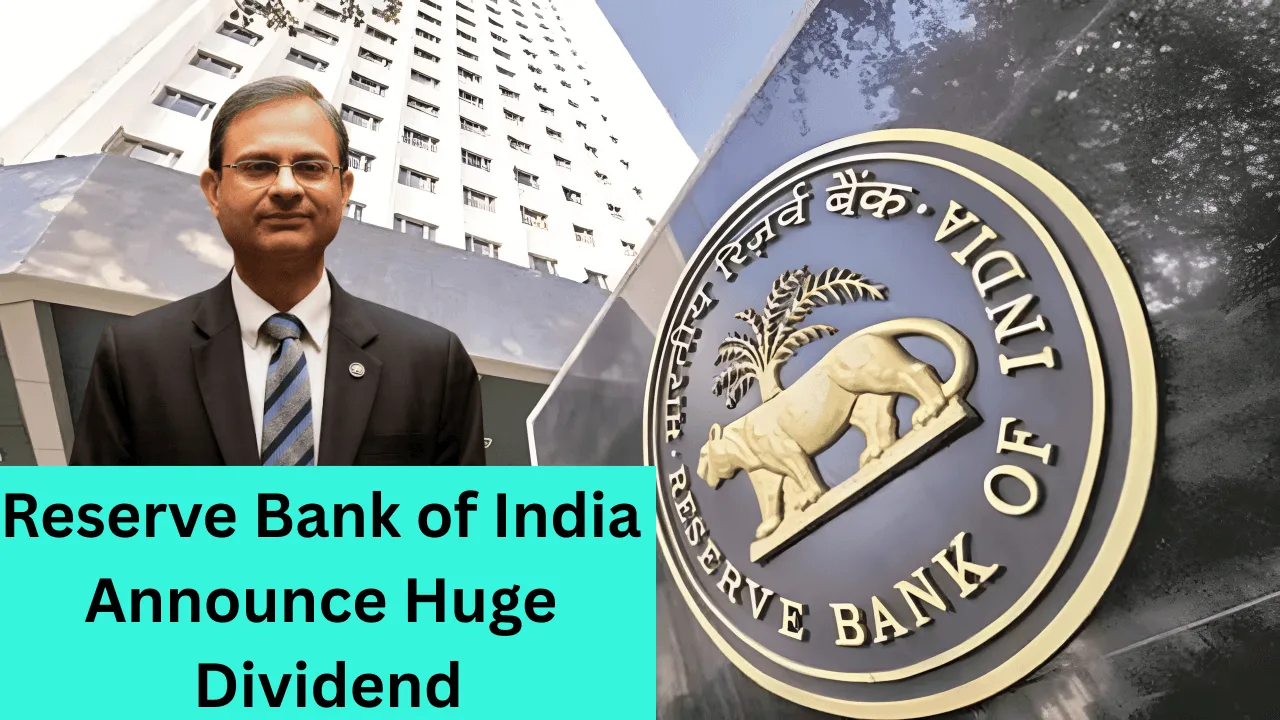Reserve Bank of India Annual Dividend Announcement
Finally Reserve Bank of India has announced its dividend, and every year it is awaited, especially by the government. And let me tell you that this time, a bumper price has been given to the government. Yes, 2.7 lakh crores. You can see this news RBI is to pay a record 2.69 lakh crore dividend to the government.
So let us understand this in a little detail that what happened after all?
I mean, how does RBI earn money here?
Why does it give a dividend?
And what happened this time, due to which such a record bumper dividend is being given to the government?
There is a lot to know. Let’s move ahead.
Record Surplus from Reserve Bank of India
This time the Reserve Bank of India has decided that 2.69 lakh crores, which is the highest ever surplus till now. This will be given to the government. Meaning government means central government, and if you remember here, ₹87,000 crores was given in 2023. Last year, ₹2.1 lakh crores was given in 2024.
And somewhere this time, the estimate had already come. The economists believed that ₹5 lakh crore to ₹3.5 lakh crores can be given as dividends this time. So, exactly, if you see, it has come to 2.69 lakh crores. But this year, even more than that has been given, 2.7 lakh crores.
What is the RBI Dividend and Why is it Important?
Well, the first question that comes now is, what is the RBI dividend? Why does the RBI give it? See, it is a simple thing. You must have heard about dividends. It is like profit sharing between shareholders. Meaning, the profit of the companies is shared with your shareholders. So, the same thing is the dividend.
Who is the owner of RBI here?
The owner of RBI is the government. It is the central government.
So, if the RBI gets any profit, benefit, then with whom will it share that profit?
RBI will share it with the government. So, this is the same thing here.
Legal Basis of Reserve Bank of India’s Dividend
And keep in mind that for the central government, it is one of the key non-tax revenues. Meaning, if you look at non-tax revenue, it is one of the highest that the government gets here through the RBI. Well, you should also know its legal basis.
There is a section 47 in the RBI Act 1934, and it is written in it that after making provision for bad and doubtful day depreciation in the asset, the balance of profits shall be paid to the Central Government. It is written.
Vimal Jalan Committee and Dividend Policy
A six-member panel was formed, in it was asked on what basis the profit sharing and dividends should be. So, this report came in 2019, and it said that the RBI should maintain its contingency risk buffer of 5 1/2 to 6.5%. See what happens, the RBI is also an institution.
It is a type of bank. It may also fail in the future. Some crisis may come. So, to deal with that crisis, the RBI should also have some buffer. There should be some extra money, and that is why we call it a contingency risk buffer. So, here the buffer should be 5 1/2 to 6.5% of RBI’s balance sheet.
So, after taking out that buffer, whatever extra profit remains with the RBI, the RBI will transfer it to the Central Government. Meaning here we have to ensure that the RBI is not in danger, and maximum dividends are given to the government. And on this basis, if you see till now RBI has passed the dividend to the government.
How Does the Reserve Bank of India Earn Money?
Now, see, the first question that comes is, how does the RBI earn money?
Because the RBI is not a commercial bank. It does not have any motive that we have to earn profit. It is never the motive of the RBI that we have to earn profit. That is the motive of a commercial bank.
But here RBI does many such operations like foreign asset management, banking operations, through which it keeps earning automatically.
Interest on Foreign Exchange Reserves
What is it that the interest that is received here through foreign exchange reserve, I mean to say that you must know that RBI has a reserve of 600 billion dollars, forex reserve, then where does RBI keep this forex reserve, it is not that RBI is keeping all of it in the form of cash with itself, it is not like that in the locker, here a lot of money is invested in bonds, for example, the US government issues bonds which are called treasury bills, then RBI invests that money in treasury bills and what happens there?
RBI keeps getting interest through bonds, which is a fixed rate of interest. So, what happened was that in 2023-24-25, if you see the last one or two years, the RBI has received a lot of interest here through bonds. So this is a big reason.
Interest from Domestic Government Securities
So here RBI earns interest through the foreign exchange reserve. Second, domestic government security. Like, in macroeconomic policy, you must have heard that through open market operations, the RBI buys and sells government bonds. So, in that case also, the RBI earns interest through coupon payments. So, this is also a method.
Seigniorage from Currency Issuance
Second is currency insurance. See what happens, sometimes new notes are issued to increase the money supply in the market. And look, this is a very big source of earning. Think about it, if the RBI is issuing a new ₹500 note. Now, how much will it cost to make it?
Hardly three, four, or ₹5 notes will come; let’s say ₹10 comes. The remaining ₹490 is a profit for the RBI in a way. So this is your profit. This is the face value of currency minus the cost of printing. So this is a very significant revenue.
Lending to Commercial Banks
Then there is your lending to commercial banks. You must have heard about repo rate, reverse repo rate, or marginal standing facility. There are many ways through which the RBI lends money to commercial banks. So when it lends, it gets some interest. So that is also a way through which the RBI gets money.
Profits from Forex Market Intervention
Then the second is your forex market intervention. You must have seen that RBI buys dollar many times and then sells dollar, so the difference between them is that suppose when dollar was weak, RBI bought dollar here at a low price and when dollar became strong, RBI sold dollar here, in that case also RBI earns a lot of profit.
Other Income Sources
And then apart from that there are many other income sources. For example, the fees and penalties that the RBI imposes on banks, the RBI which is less commensurate many times You must have seen that it issues ₹ 100 coins of different types, so it gets money from that. Rent which it gets from properties, The RBI gets many from properties, so it earns rent from there. So there are many such sources from which where RBI gets income.
Why the Reserve Bank of India’s Dividend is So High This Year
But the question here is, why this time, how did the RBI make such a record bumper profit, for which it is giving up to 2.7 lakh crores to the government?
First of all, as I was telling you here, the RBI gets interest through domestic bonds and foreign securities. So what happened last year, in 2023-24 and 24-25, is that the RBI has received a lot of interest here. The interest that had risen, now what is happening is now the interest is slowly starting to decrease. But till now, the interest was running very high in the US and many places. So, because of that, the RBI has received a lot of money through interest.
Then the other thing is that look, I was talking about dollar, dollar buying and selling, if you look at it over the last year, there has been a lot of difference. You will remember that the value of the dollar had gone up to around 88. $1 equals around ₹ 88.
And before that, if you look, how much was the dollar?
It was around ₹ 83. So it is possible that when the RBI was at ₹ 83, $1 = ₹ 83 ₹ 84, here RBI must have bought a lot of dollars and when the value of dollar increased here, when $1 = 88, then RBI must have sold the dollars and because of this, this difference has come here, it is being told here that RBI made a lot of profit and apart from this, you can see that the forex reserve here also reached its peak because RBI was continuously collecting dollars.
Impact of Reserve Bank of India Dividend on Government and Economy
So these are the reasons due to which RBI has got a massive surplus this time and it is transferring it to the government.
Now the question is what will be the impact of all this money coming to the Modi government?
Fiscal Consolidation and Reduced Borrowing
The first is fiscal consolidation. The government has to give subsidies. It has to be spent on infrastructure. There are social schemes.
So, what does the government do because of this?
It does a lot of borrowing. It borrows money. Now, borrowing means the fiscal deficit increases. But the government is trying to bring the fiscal deficit to 4.5% of GDP by 2025-26. I mean, if it is getting so much money from the RBI.
Why does the government need to do so much borrowing?
Borrowing will reduce it a little bit. It will reduce borrowing. So this will manage the fiscal deficit to a great extent. And keep in mind that foreign investors pay a lot of attention to the fiscal deficit because if the government is borrowing a lot, it means that the government will have to pay interest, and the government’s revenue will be impacted in a way.
Boost to Capital Spending
So this is also a big thing that the fiscal deficit will reduce here. Secondly, the borrowing needs that I told you about will reduce, and then there is the government will spend more on capital spending. Look, the government pays salaries, pensions, that is an expense, but the actual expenses, that is, the development expenses, matter a lot in infrastructure projects, rural spending, Make in India initiative, so the government will be able to spend more freely here.
Effect on Bond Yield and Loan Rates
So, all this is going to be the impact of this surplus. Well, I wanted to tell you one more thing. What happens is that when the government reduces borrowing here, then because of this, your yield goes down. For example, what happens is that suppose this is a 10-year bond which has been issued by the government.
Now you will see that the yield of the 10-year bond has decreased in the last few days. Because the expectation was that the government is going to get a lot of surplus from RBI and the government will reduce borrowing and when the government reduces borrowing, the interest rate, basically the yield, reduces and when the yield reduces, when the interest rate on government bonds reduces, it means that the interest rates of other banks, when you take a home loan, are also affected and that also starts reducing gradually.
So, who will ultimately benefit from this?
The economy will be the one where people will borrow more, people will spend more, spend more and our GDP will increase. So this is a positive. You can say that in a way.
Criticism of Large Surplus Transfers by Reserve Bank of India
Well, this is also a criticism. RBI is giving so much surplus. Well, we have seen the benefits, but what is the criticism and debate about this?
Government Dependency on RBI
The first thing is that the Central Government becomes very dependent on the dividend of the RBI. It means that this should not happen. The government should work independently, and the dividend received here should be seen as a bonus.
But if the government gets so much money, what will happen because of it?
The government’s expectations will increase, and the government will become over-reliant. It means that the government will always look for this every year, that yes, look how much dividend it is getting. It will push the RBI, forcing it to do something.
Risks to RBI’s Independence and Capital Buffer
So the question of independence also arises that whatever we say, whichever institution is the RBI, Central Bank, their decision should be independent. So this is a bit of a problem. Then the second thing is your capital buffer.
If the RBI is transferring so much money to the government, then the RBI’s reserve, which can be used in times of crisis, is also getting reduced in a way. So somewhere or the other, economists have many criticisms about this that RBI should not transfer so much money and should keep as much reserve as possible with itself so that if RBI faces any crisis in the future, it can survive and if you see global comparison, there are very few countries which give such bumper dividend to the government.
Read More Breaking News: https://hindiakhbarr.com/category/breaking-news/












Motivasi Harian
Wonderful website you have here but I was wondering if
you knew of any user discussion forums that cover
the same topics talked about in this article? I’d really
like to be a part of group where I can get responses from other experienced individuals that share the
same interest. If you have any suggestions, please let me know.
Bless you!